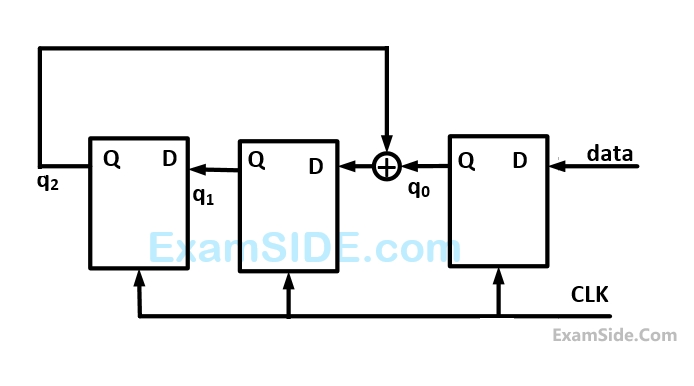1
GATE CSE 2006
MCQ (Single Correct Answer)
+2
-0.6
Consider the relation enrolled (student, course) in which (student, course ) is the primary key, and the relation Paid (student, amount) where student is the primary key. Assume no null values and no foreign keys or integrity constraints. Assume that amounts $$6000, 7000, 8000,9000$$ and $$10000$$ were each paid by $$20$$% of the students. Consider these query plans (Plan $$1$$ on left, Plan $$2$$ on right) to ''List all courses taken by students who have paid more than $$x''$$.




A disk seek takes $$4ms$$, disk data transfer bandwidth is $$300MB/s$$ and checking a tuple to see if amount is greater than $$x$$ takes $$10\mu s.$$ Which of the following statements is correct?
2
GATE CSE 2006
MCQ (Single Correct Answer)
+2
-0.6
Consider the circuit in the diagram. The $$ \oplus $$ operator represents $$EX$$-$$OR.$$ The $$D$$ flip-flops are initialized to zeros (cleared).


The following data: $$100110000$$ is supplied to the ''data'' terminal in nine clock cycles. After that the values of $${q_2}{q_1}{q_0}$$ are
3
GATE CSE 2006
MCQ (Single Correct Answer)
+1
-0.3
You are given a free running clock with a duty cycle of $$50$$% and a digital waveform $$f$$ which changes only at the negative edge of the clock. Which one of the following circuits (using clocked $$D$$ flip-flops) will delay the phase of $$f$$ by $${180^0}?$$
4
GATE CSE 2006
MCQ (Single Correct Answer)
+2
-0.6
Consider the circuit above. Which one of the following options correctly represents $$f(x,y,z)?$$


Paper analysis
Total Questions
Algorithms
14
Compiler Design
6
Computer Networks
6
Computer Organization
9
Data Structures
12
Database Management System
8
Digital Logic
4
Discrete Mathematics
25
Operating Systems
8
Programming Languages
1
Theory of Computation
6
More papers of GATE CSE
GATE CSE 2025 Set 2
GATE CSE 2025 Set 1
GATE CSE 2024 Set 2
GATE CSE 2024 Set 1
GATE CSE 2023
GATE CSE 2022
GATE CSE 2021 Set 2
GATE CSE 2021 Set 1
GATE CSE 2020
GATE CSE 2019
GATE CSE 2018
GATE CSE 2017 Set 1
GATE CSE 2017 Set 2
GATE CSE 2016 Set 1
GATE CSE 2016 Set 2
GATE CSE 2015 Set 3
GATE CSE 2015 Set 1
GATE CSE 2015 Set 2
GATE CSE 2014 Set 3
GATE CSE 2014 Set 1
GATE CSE 2014 Set 2
GATE CSE 2013
GATE CSE 2012
GATE CSE 2011
GATE CSE 2010
GATE CSE 2009
GATE CSE 2008
GATE CSE 2007
GATE CSE 2006
GATE CSE 2005
GATE CSE 2004
GATE CSE 2003
GATE CSE 2002
GATE CSE 2001
GATE CSE 2000
GATE CSE 1999
GATE CSE 1998
GATE CSE 1997
GATE CSE 1996
GATE CSE 1995
GATE CSE 1994
GATE CSE 1993
GATE CSE 1992
GATE CSE 1991
GATE CSE 1990
GATE CSE 1989
GATE CSE 1988
GATE CSE 1987
GATE CSE
Papers
2023
2022
2020
2019
2018
2013
2012
2011
2010
2009
2008
2007
2006
2005
2004
2003
2002
2001
2000
1999
1998
1997
1996
1995
1994
1993
1992
1991
1990
1989
1988
1987



